| Rights |
|---|
 |
| Theoretical distinctions |
| Human rights |
| Rights by beneficiary |
| Other groups of rights |
The Commission on Unalienable Rights was a commission created under the U.S. State Department in July 2019. It released its final report in August 2020.
| Rights |
|---|
 |
| Theoretical distinctions |
| Human rights |
| Rights by beneficiary |
| Other groups of rights |
The Commission on Unalienable Rights was a commission created under the U.S. State Department in July 2019. It released its final report in August 2020.
In July 2018, the State Department hosted its first annual Ministerial to Advance Religious Freedom. At a Heritage Foundation panel discussion, the Christian conservative attorney Benjamin Bull claimed that the left-wing was using “newly manufactured human rights" (an apparent reference to LGBTQ-related rights) to "crush” the “traditional” and “natural" rights recognized by Christians. [1]
On May 30, 2019, the State Department announced its intention to create the commission . The announcement was published in the Federal Register and stated that the commission's purpose was to "provide the Secretary of State advice and recommendations concerning international human rights matters" along with "fresh thinking about human rights discourse where such discourse has departed from our nation's founding principles of natural law and natural rights." [2]
On June 28, 2019, it was reported that Robert P. George, McCormick Professor of Jurisprudence at Princeton University, was involved with the planning of the commission. [3]
On July 7, 2019, then Secretary of State Pompeo published an op-ed in The Wall Street Journal explaining the commission's intended focus. He said that "universal," "unalienable" rights must be distinguished from "ad hoc rights granted by governments." Modern references to "new categories of rights", per Pompeo, aim at "rewarding interest groups and dividing humanity into subgroups." He warned that "loose talk of 'rights' unmoors us from the principles of liberal democracy." Pompeo described that the commission was expected to generate debate over philosophical questions such as: "What are our fundamental freedoms? Why do we have them? Who or what grants these rights? How do we know if a claim of human rights is true? What happens when rights conflict? Should certain categories of rights be inextricably 'linked' to other rights?" The commission was to be designated as an advisory body, rather than as a policy-making body. [4]
The commission's creation was announced on July 8, 2019. [5] [6] According to Pompeo, the mission of the commission was to offer "advice on human rights grounded in our nation's founding principles and the principles of the 1948 Universal Declaration of Human Rights". [7]
The following day, State Department spokesperson Morgan Ortagus gave a press briefing in which she explained that "authoritarian regimes [are] subverting this human rights context" and claimed that the U.N. Human Rights Commission had become "a laughingstock." She added that the new commission would not be "partisan" and did not intend to "create new policy on human rights." [8] She also mentioned that Sam Brownback, the U.S. Ambassador-at-Large for International Religious Freedom, had recently produced an International Religious Freedom Report. [9]
The commission released its draft report on July 16, 2020. [10] [11] [12] [13] It released its final report on August 26, 2020. [14]
As initially announced on July 8, 2019, the commission had 12 members, including eight men and four women. [15]
The chairperson was Mary Ann Glendon, a former U.S. ambassador to the Vatican who now teaches at Harvard Law School. The rapporteur is F. Cartwright Weiland, who works at the State Department. Kiron Skinner was named as the head of the executive secretary, but she lost her State Department job several weeks later. [16]
The other members are:
Human rights activist Aaron Rhodes, the former executive director of the International Helsinki Federation for Human Rights, wrote that "Secretary of State Mike Pompeo deserves praise for proposing an Unalienable Rights Commission to help guide American human-rights policy" and that the State Department was accurate in naming natural law and natural rights as "the core foundational principles of human rights". [17]
Walter Russell Mead, founder of center-left think tank New America, wrote in The Wall Street Journal that the commission's report was "a thoughtful and carefully reasoned document that may serve as an important landmark in future debates". [18] He added that the commission's "approach offers more opportunity for constructive diplomacy" than some approaches sought by "many contemporary activists". [18]
In July 2020, the editorial board of The Wall Street Journal issued an editorial in support of the commission's report. [19] The board wrote that the report was fair and historically accurate, noting that the report "discusses at length the way the U.S. failed to live up to its founding promise of unalienable rights—most significantly with slavery and the Jim Crow era—and emphasizes that U.S. credibility in promoting human rights abroad depends on America’s example at home." [19] The board added that "Mr. Pompeo’s initiative is not the coded theocratic or authoritarian document of his critics’ partisan imaginations", but instead "a sensible effort to put American human-rights diplomacy on a more sustainable footing." [19]
In December 2020, Nahdlatul Ulama, the world's largest [20] independent Muslim organization, sent Pompeo a letter stating that the organization has "unreservedly embraced the Report of the Commission on Unalienable Rights" and that the report constitutes a "re-affirmation of the spirit and substance of fundamental human rights". [21]
GLAAD, an LGBTQ rights organization, found that seven members of the commission had made anti-LGBTQ remarks in the past. [22] Joanne Lin, national director of advocacy and government affairs at the human rights organization Amnesty International USA, says that this commission "appears to be an attempt to further hateful policies aimed at women and LGBTQ people." [23] Roger Pilon, chair of Constitutional Studies for the Cato Institute, wrote that, "the distinction between natural law, especially if theologically based, and natural rights to liberty looms large". [24]
On June 12, 2019, Senators Bob Menendez (D-N.J.), Patrick Leahy (D-Vt.), Dick Durbin (D-Ill.), Jeanne Shaheen (D-N.H.), and Chris Coons (D-Del.) wrote to Secretary of State Mike Pompeo to "express our deep concern with the process and intent behind the Department of State’s recently announced Commission on Unalienable Rights...With deep reservations about the commission, we request that you not take any further action regarding its membership or proposed operations without first consulting with congressional oversight and appropriations committees." [25] On June 13, 2019, the U.S. House debated an en bloc amendment which included a provision to defund the commission. [26] [27] [28] On June 18, 2019, the U.S. House voted 231–187 in favor of the en bloc amendment. [29] [30] [31] Not long after the establishment of the commission major human rights organizations warned that the commission could cause significant harm to the global human rights system. [32] In May 2020, 167 rights advocates and organizations from 28 different countries put out a statement expressing "grave concern" about the direction of the commission and urged it to "reject the prioritization of freedom of religion as a cloak to permit violations of the human rights of women, girls, and lesbian, gay, bisexual and transgender (LGBT) people." [33]
After the release of the commission's final report, former U.S. Deputy Secretary of State Rori Kramer criticized the commission and in an interview with The Guardian , saying that "[f]rom day one when Pompeo announced this, the intention was always to change the actual working policy of the department to fit his narrow religious views in a way that really upends the normal working order of the department." [34] Miguel H. Díaz, former United States Ambassador to the Holy See joined by 125 Catholic theologians and leaders, signed a public petition which, among other things, expresses concern that the commission's composition indicated that it was poised to lead to policies that will "harm people who are already vulnerable, especially poor women, children, LGBTI people, immigrants, refugees, and those in need of reproductive health services." [35]
In addition to political leaders and human rights organizations, the commission's report saw opposition from a large number of human rights advocates and scholars. Notable ones include Kenneth Roth, the executive director of Human Rights Watch, who described the commission's report as "a frontal assault on international human rights law." [36] Gerald L. Neuman, Director of the Human Rights Program at Harvard Law School and a former member of the United Nations Human Rights Committee, who had previously submitted formal comments to the commission outlining its defects, [37] was joined by Martha Minow (former Dean of Harvard Law School), Mathias Risse (Director of the Carr Center for Human Rights Policy at Harvard University), and Katharine Young (Professor of Law at Boston College Law School) in criticizing the report. [38] Gerald L. Neuman [39] and Katharine Young [40] also published more extensive academic contributions in connection with the report and related topics.
Human rights in China are periodically reviewed by international bodies, such as human rights treaty bodies and the United Nations Human Rights Council's Universal Periodic Review. The Chinese Communist Party (CCP), the government of the People's Republic of China (PRC), their supporters, and other proponents claim that existing policies and enforcement measures are sufficient to guard against human rights abuses. However, other countries, international non-governmental organizations (NGOs) including Human Rights in China and Amnesty International, and citizens, lawyers, and dissidents inside the country, state that the authorities in mainland China regularly sanction or organize such abuses.

Harvard Kennedy School (HKS), officially the John F. Kennedy School of Government, is the school of public policy and government of Harvard University in Cambridge, Massachusetts. The school offers master's degrees in public policy, public administration, and international development, four doctoral degrees, and various executive education programs. It conducts research in subjects relating to politics, government, international affairs, and economics. As of 2021, HKS had an endowment of $1.7 billion. It is a member of the Association of Professional Schools of International Affairs (APSIA), a global consortium of schools that trains leaders in international affairs.
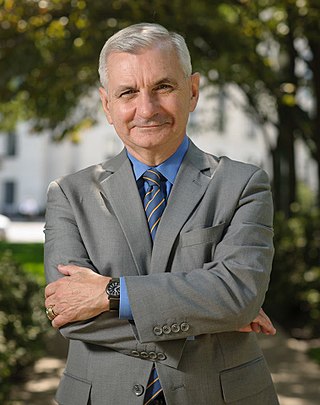
John Francis Reed is an American lawyer and politician serving as the senior United States senator from Rhode Island, a seat he was first elected to in 1996. A member of the Democratic Party, he was the U.S. representative for Rhode Island's 2nd congressional district from 1991 to 1997. Reed graduated from the United States Military Academy and Harvard University, serving in the U.S. Army as an active officer from 1971 to 1979. He is the dean of Rhode Island's congressional delegation.
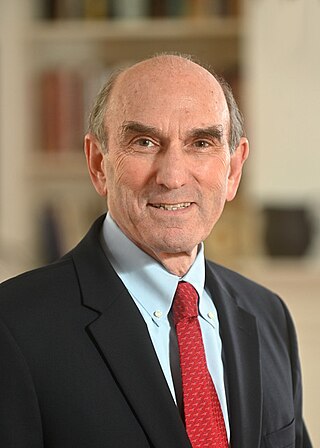
Elliott Abrams is an American politician and lawyer, who has served in foreign policy positions for presidents Ronald Reagan, George W. Bush, and Donald Trump. Abrams is considered to be a neoconservative. He is currently a senior fellow for Middle Eastern studies at the Council on Foreign Relations. He served as the U.S. Special Representative for Venezuela from 2019 to 2021 and as the U.S. Special Representative for Iran from 2020 to 2021.

Mary Ann Glendon is the Learned Hand Professor of Law at Harvard Law School and a former United States Ambassador to the Holy See. She teaches and writes on bioethics, comparative constitutional law, property, and human rights in international law. She supports government bans on abortion services and "writes forcefully against the expansion of abortion rights."

In the United States, public opinion and jurisprudence on lesbian, gay, bisexual, and transgender (LGBT) rights have developed significantly since the late 1980s. In 1961, beginning with Illinois, states began to decriminalize same-sex sexual activity, and in 2003, through Lawrence v. Texas, all remaining laws against same-sex sexual activity were invalidated. In 2004, beginning with Massachusetts, states began to offer same-sex marriage, and in 2015, through Obergefell v. Hodges, all states were required to offer it. In many states and municipalities, LGBT Americans are explicitly protected from discrimination in employment, housing, and access to public accommodations. Many LGBT rights in the United States have been established by the United States Supreme Court, which invalidated state laws banning protected class recognition based upon homosexuality, struck down sodomy laws nationwide, struck down Section 3 of the Defense of Marriage Act, made same-sex marriage legal nationwide, and prohibited employment discrimination against gay and transgender employees. LGBT-related anti-discrimination laws regarding housing and private and public services varies by state. Twenty-three states plus Washington, D.C., Guam, and Puerto Rico outlaw discrimination based on sexual orientation, and twenty-two states plus Washington, D.C., outlaw discrimination based on gender identity or expression. Family law also varies by state. Adoption of children by same-sex married couples is legal nationwide since Obergefell v. Hodges.

The United States Commission on International Religious Freedom (USCIRF) is a U.S. federal government commission created by the International Religious Freedom Act (IRFA) of 1998. USCIRF Commissioners are appointed by the President and the leadership of both political parties in the Senate and the House of Representatives. USCIRF's principal responsibilities are to review the facts and circumstances of violations of religious freedom internationally and to make policy recommendations to the President, the Secretary of State, and the Congress.
Becket, also known as the Becket Fund for Religious Liberty, is a non-profit public interest law firm based in Washington, D.C., that describes its mission as "defending the freedom of religion of people of all faiths". Becket promotes accommodationism and is active in the judicial system, the media, and in education.

The International Religious Freedom Act of 1998 was passed to promote religious freedom as a foreign policy of the United States, to promote greater religious freedom in countries which engage in or tolerate violations of religious freedom, and to advocate on the behalf of individuals persecuted for their religious beliefs and activities in foreign countries. The Act was signed into law by President Bill Clinton on October 27, 1998. Three cooperative entities have been maintained by this act to monitor religious persecution.
Russell A. Berman is an American academic and professor specializing in German studies and Comparative literature. He serves as the Walter A. Haas Professor in the Humanities at Stanford University. He is also a senior fellow at the Hoover Institution. He is the director of Stanford's Thinking Matters program. He previously served as associate dean and director of Stanford's Overseas Studies Program.

The United States-Hong Kong Policy Act, or more commonly known as the Hong Kong Policy Act or Hong Kong Relations Act, is a 1992 act enacted by the United States Congress. It allows the United States to continue to treat Hong Kong separately from Mainland China for matters concerning trade export and economic control after the 1997 Hong Kong handover.

Michael H. Posner is an American lawyer, the Founding Executive Director and later the President of Human Rights First, the former Assistant Secretary of State for Democracy, Human Rights, and Labor (DRL) of the United States, currently director for the Center of Business and Human Rights at NYU Stern School of Business, as well as Professor of Business and Society at New York University Stern School of Business, and a board member of the International Service for Human Rights.

Immigration Equality is a United States nonprofit organization founded in 1994. Based in New York, it both advocates for and directly represents LGBTQ and HIV-positive people in the immigration system.
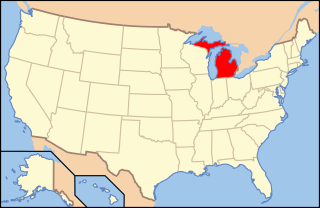
Lesbian, gay, bisexual, and transgender (LGBT) people in the U.S. state of Michigan enjoy the same rights as non-LGBT residents. Same-sex sexual activity is legal in Michigan under the US Supreme Court case Lawrence v. Texas, although the state legislature has not repealed its sodomy law. Same-sex marriage is legal. Discrimination on the basis of both sexual orientation and gender identity is unlawful since July 2022, was re-affirmed by the Michigan Supreme Court - under and by a 1976 statewide law, that explicitly bans discrimination "on the basis of sex". The Michigan Civil Rights Commission have also ensured that members of the LGBT community are not discriminated against and are protected in the eyes of the law since 2018 and also legally upheld by the Michigan Supreme Court in 2022. In March 2023, a bill passed the Michigan Legislature by a majority vote - to formally codify both "sexual orientation and gender identity" anti-discrimination protections embedded within Michigan legislation. Michigan Governor Gretchen Whitmer signed the bill on March 16, 2023.

The Office of the Special Envoy to Monitor and Combat Antisemitism is an office of the Under Secretary for Civilian Security, Democracy, and Human Rights at the United States Department of State. The office "advances U.S. foreign policy on antisemitism" by developing and implementing policies and projects to support efforts to combat antisemitism.
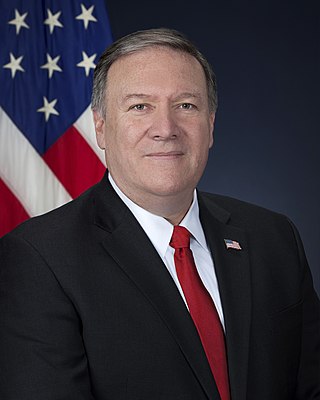
Michael Richard Pompeo is an American politician who served in the administration of Donald Trump as director of the Central Intelligence Agency (CIA) from 2017 to 2018 and as the 70th United States secretary of state from 2018 to 2021. He also served in the United States House of Representatives from 2011 to 2017.

Kiron Kanina Skinner is a former Director of Policy Planning at the United States Department of State in the Trump administration. Skinner is presently the Taube Professor of International Relations and Politics at the Pepperdine University School of Public Policy, where she teaches graduate courses in national security and public leadership. Prior to that, she was the Taube Professor of International Relations and Politics at Carnegie Mellon University, and the founding director of the Institute for Politics and Strategy and associated centers at the university. She is also the W. Glenn Campbell Research Fellow at the Hoover Institution. After leaving the Department of State, she returned to her position at Carnegie Mellon University until stepping down in 2021.

The social policy of the Donald Trump administration was generally socially conservative. As of 2016, Donald Trump described himself as pro-life with exceptions for rape, incest, and circumstances endangering the life of the mother. He said he was committed to appointing justices who may overturn the ruling in Roe v. Wade. Trump appointed three Supreme Court justices during his presidency. All of them later went on to vote in the majority opinion of Dobbs v. Jackson Women's Health Organization, the Supreme Court case overturning Roe v. Wade and ending federal abortion rights nationwide.

Thomas Ulrich Brechbuhl is a Swiss-American businessman and former government official, having held the position of Counselor of the United States Department of State from May 1, 2018, to January 20, 2021. He was appointed by and reported to Secretary of State Mike Pompeo, and replaced Maliz E. Beams. Along with the role of Counselor, he served as the Acting Under Secretary for Public Diplomacy and Public Affairs at the Department of State from March to September 2020.
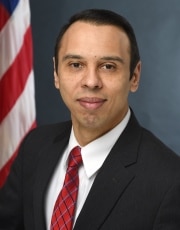
Roger Thomas Severino is an American attorney who served as the director of the Office of Civil Rights (OCR) at the United States Department of Health and Human Services from 2017 to 2021. He is currently a Senior Fellow at the Ethics and Public Policy Center and a contributor on abortion policy to Project 2025.
The largest Islamic organization on the planet has a request for all Muslims. Quit calling people kafir, an Arabic word for infidels or nonbelievers.